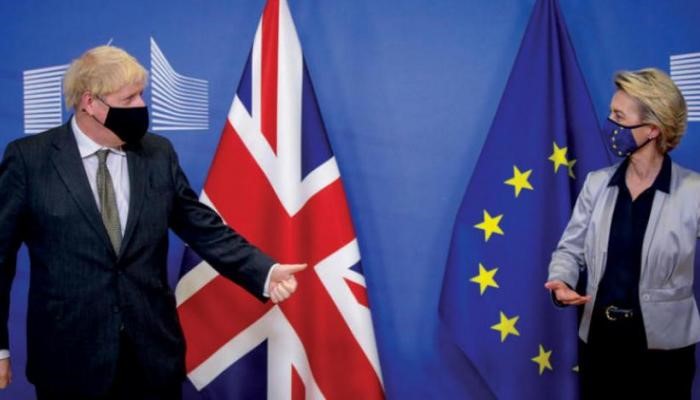LOC09:19
06:19 GMT
 British Prime Minister Boris Johnson inked the Brexit treaty
British Prime Minister Boris Johnson inked the Brexit treaty
KUWAIT, Dec 30 (KUNA) -- The far-reaching impact of the coronavirus (COVID-19) in 2020 had somehow shifted many aspects of life on earth including relations amongst world countries.
From Brexit complications to the continued blight of the Muslim Rohingya and so on, the dynamic of global relations had be radically shifted in this year.
The following are the most prominent shifts in International relations in 2020:
Jan 9: The US State Department declared an agreement with Canada on a joint plan concerning vital and rare materials used in producing smart phones, computers and some military equipment.
Jan 23: The US enacted new regulations allowing custom officers to bar entry of women travelers coming to the US for babies' delivery so they could be entitled to be granted the US citizenship.
Jan 23: Queen Elizabeth inked the Brexit bill.
Jan 24: President of the European Council Charles Michel and President of the European Commission Ursula Von der Leyen inked an accord for the UK Brexit.
Jan 24: British Prime Minister Boris Johnson inked the Brexit treaty.
Jan 29: The European Parliament endorsed the Brexit.
Feb 7: US Secretary of State Mike Pompeo declared a ban on the airlines company owned by the Venezuelan government.
Feb 11: Philippine President Rodrego Duterte abolished the "treaty for visiting forces of the United States" after repeatedly threatening to downgrade the defense alliance with Washington.
March 3: Turkey and Greece inked a commercial cooperation agreement despite tension over inflow of immigration seekers.
March 13: Switzerland suspended the open borders agreement with the EU (Schengen) to curb spillover of the coronavirus.
March 16: Canada declared closing the borders in the face of foreigners including those of lifelong residency in a bid to stem spread of COVID-19.
March 16: Spain closed the border as part of measures to curb the coronavirus.
March 19: Luxembourg closed its airport as a measure against the coronavirus.
March 19: Belgium declared closing the borders except for necessities as a move against the coronavirus.
March 21: Pakistan suspended air flights for two weeks fearing spillover of the pathogen.
March 27: NATO declared North Macedonia became a member.
May 21: US President Donald Trump declared that Washington would withdraw from the Open Skies treaty due to what he said Russia's failure to abide by it.
May 29: President Trump announced termination of relations with the World Health Organization because of what he believed UN agency refused US reform proposals.
June 3: The Austrian government decided to unlock its borders with neighboring countries except with Italy.
June 3: The German Government lifted travel ban to 29 countries, after a complete closure of its airports and borders due to the spread of COVID-19.
June 4: Turkish trade Minister Ruhsar Pekcan announced that her country re-opened freight transport borders with neighboring countries, including Iran and Iraq.
June 9: Greek Foreign Minister Nikos Dendias and his Italian counterpart, Luigi Di Maio, signed the maritime border demarcation agreement between the two countries.
June 12: NATO granted Ukraine "Enhanced Opportunities Partner."
June 15: Brussels Airlines resumed operations coinciding with EU countries's lifting of travel restrictions within Europe.
June 15: Germany announced the re-opening of its borders with EU after three months of lockdown due to coronavirus pandemic.
June 17: US Secretary of State Mike Pompeo announced that the US would begin a sustained campaign of sanctions against Syria under the Caesar Act.
June 21: Pakistan declared resuming of the regular international flights to facilitate the return of its nationals.
July 7: US administration sent a letter withdrawing the US from World Health Organization (WHO) over coronavirus response.
July 20: US sanctioned Chechen leader Ramzan Kadryov for alleged major human rights violations in his country.
July 20: Britain suspended extradition treaty with Hong Kong in an escalation of a dispute with China over its introduction of a national security law in the region.
July 23: Finland reopened embassy in Iraq after over 30 years.
July 24: China ordered the closure of the US consulate in Chengdu, days after Washington forced the Chinese consulate in Houston to cease operations.
July 30: European Union extended sanctions on North Korea for one year.
Aug 15: US and Poland Enhanced Defense Cooperation Agreement to enhance military cooperation and increase the US military presence in Poland to further strengthen NATO deterrence.
Aug 20: China's Hong Kong suspended bilateral agreement with US in response to Washington's ending some bilateral agreements with Hong Kong.
Aug 31: Russia decided to expel three Slovak diplomats, in response to a similar Slovak move.
Sept 10: The European Parliament suspended Myanmar leader Aung San Suu Kyi from (Sakharuv) Prize for human rights, because of her "failure to act and her acceptance of the ongoing crimes against the Rohingya Muslims community in Myanmar.
Oct 27: US and India signed five agreements include one on exchanging intelligence.
Nov 6: EU imposed sanctions on President Aleksandr Lukashenko of Belarus and 15 aides.
Dec 24: US State Secretary Mike Pompeo announced establishment of a consulate in Morocco's Western Sahara shortly after Washington recognized sovereignty of Morocco over the region.
Dec 24: EU and the UK reached a historical agreement on Brexit after months of grueling negotiations over fishing, commerce, and business. The agreement will provide an organized exit for Britain from the EU. (end)
sr.eng